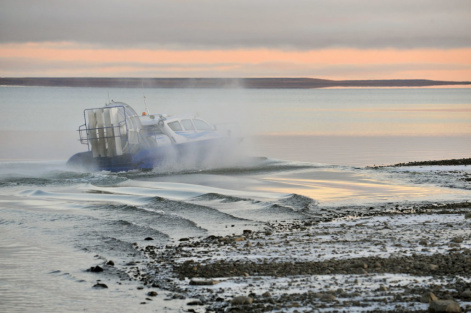A method has been proposed for the restoration of ecosystems in Arctic lakes.
8 December 2021 г.

The Corresponding Member of the Russian Academy of Sciences, Head of the Laboratory of Experimental Hydroecology of the Institute of Biophysics SB RAS, Mikhail Gladyshev said during the meeting of the discussion club of the Project Office for the Development of the Arctic, that according to the studies, even after the complete cessation of wastewater discharges, low-productivity Arctic water bodies cannot return to their original natural state during several decades. An artificial increase in the productivity of such reservoirs due to the introduction of mineral fertilizers poses the danger of disrupting the balance of the ecosystem in another direction, namely, causing the "blooming" of water due to cyanobacteria or "green tides" of filamentous algae. With such phenomena, reservoirs not only look unaesthetic, but many valuable species of fish also disappear there.
Scientists proposed to test the method of guanotrophication, that is, the introduction of a natural fertilizer obtained from birds, on the Taimyr lakes, which have been heavily polluted over decades of the operation of industrial enterprises in the peninsula.
“Artificial guanotrophication can be considered as an environmentally friendly technology for restoring water quality in dystrophic water bodies (for example, Lake Pyasino) with the obligatory reduction of external anthropogenic load. It can lead to an increase in the number of valuable commercial fish species, since it directly depends on the quantity and quality of the primary production of microalgae. Employees of the Institute of Biophysics of SB RAS, together with colleagues from the Institute of Ecology and Evolution of RAS, Institute of Biology of Inland Waters of RAS and Siberian Federal University submitted to the Project Office for the Development of the Arctic a phased program of research to test the possibility of improving the water quality and fish productivity of Arctic lakes owing to artificial guanotrophication. Russia has scientifically substantiated prerequisites for developing a technology for the restoration of Arctic lakes, ” said Mikhail Gladyshev.
“Such programs require interaction with federal authorities, as well as with businesses that are ready to participate in the restoration program. In general, this program can be implemented using the PPP mechanism, since water bodies are state-owned, with a few exceptions. Rehabilitation of reservoirs is an expensive project, which costs about $ 300 thousand a year. Not every business will be able to participate in it. And the PPP approach, with a certain amount of government support, will allow one to attract business to these topical projects! Moreover, this project makes it possible to achieve several goals of the UN sustainable development, in particular, goal 15 - "Protecting and restoring terrestrial ecosystems and promoting their sustainable use", as well as another goal, which is "Ensuring the availability and sustainable use of water resources and sanitation for everyone." Thus, of course, an experiment is needed, ”said Alexander Vorotnikov, coordinator of the expert council of the Project Office of Arctic Development.
Note that earlier, scientists of the Federal Research Center "KSB SB RAS" took part in the Big Norilsk Expedition, where they assessed the ecological state of Arctic aquatic ecosystems.
Share:
